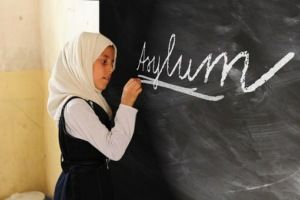News
Danish study: Spreading out immigrants a hindrance to integration
This article is more than 7 years old.
The lack of local networks in more sparsely-populated municipalities is isolating refugee families

New chair wants to make it harder for youngsters like this to obtain residency (photo: Pixabay)
According to a new study conducted by Roskilde University, the Danish practice of spreading out immigrants to different parts of the country, which is supposed to better integrate them, could be doing more damage than good.
The PhD project (here in Danish) followed five Syrian families who were granted asylum in Denmark, and it revealed that the Danish asylum system and the forced spread of immigrants to smaller towns around the country makes it more difficult for newcomers to adapt to an existence in Denmark.
“What I saw when I was with the families at the asylum centres was that they constantly met new people. They were received by other Syrian families, leading to both parents and children making new friends,” Ditte Shapiro, the researcher behind the study, told Videnskab.dk.
“But it’s difficult to live at an asylum centre when the neighbour, who has helped and supported you, is suddenly gone because the family has been moved to another asylum centre.”
The study also found that moving immigrant families to smaller communities hampered the development of a common daily lifestyle after they received a permit and were moved from the asylum centres. In particular, it was problematic that they arrived in areas where they had no local networks.
READ MORE: Socialdemokratiet: private schools that oppose integration should lose funding
Equally distributed
Another barrier for the immigrants was the Danish interpretation of a family unit, which was one that was very different from what they were accustomed to.
In only one out of the five families in the study were both parents educated at a university level, while in the other four families the mother stayed at home and raised the children while the father worked.
All four families had relied heavily on grandparents and other family members on a daily basis before the war broke out in Syria.
“When children and parents don’t have a network in the new local communities, the family core can be a vulnerable arrangement for family life,” said Shapiro.
Living in isolation
Moreover, because the immigrants were forced to live in a town where no-one has the same background or speaks the same language, it becomes impossible to get into contact with locals and families find themselves isolated.
Spredningsloven (‘Spreading law’) was adopted in 1999 to disperse immigrants equally to all municipalities in the country to improve immigration and avoid the establishment of areas heavily populated by immigrants – also contentiously called ‘ghettos’ in Denmark.
The refugees are thus sent to a municipality where they must live for at least three years. Should they move before the three years are up, they risk losing all of the social benefits provided by the state.
Last month, Socialdemokratiet and Socialistisk Folkeparti proposed a plan to tackle ‘ghetto’ problems and slow integration by upping the number of years refugees must stay in their assigned municipality to five years.










































